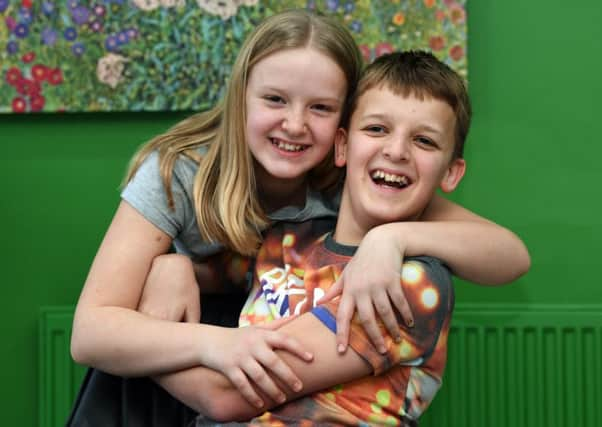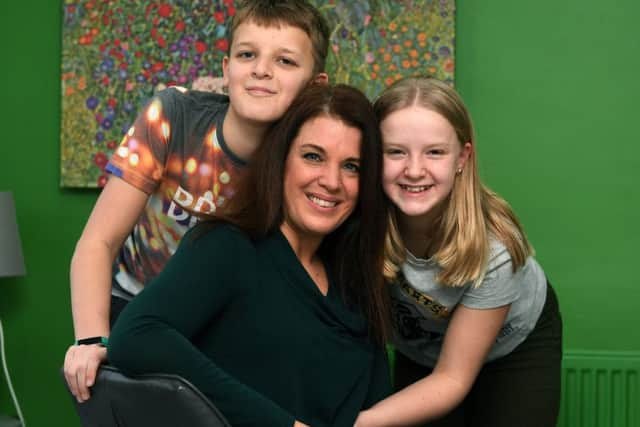Harrogate young carer Maddie shares her experience ahead of awareness day


Maddie Shaw is a typical 11-year-old in many ways. Outside of the school door, she enjoys arts and crafts, climbing and musical theatre and she is one of the thousands of children across the UK involved in Girlguiding.
She talks fondly of trips to the cinema with her friends and helping to look after her pets - cat Cleo and Norbert the hamster.
Advertisement
Hide AdAdvertisement
Hide AdWhere Maddie’s life differs from many of her peers though is in the added responsibility she takes on as a young carer for her elder brother Joe, who has autism.


“I help Joe when he gets upset,” she says. “Sometimes he gets a bit angry about things. I help him by calmly going up to him and saying ‘it’s okay, you don’t have to be upset’. I give him a big hug and he seems to be fine. It calms him down.”
Maddie has helped to care for 13-year-old Joe for much of her life. She supports him with everyday tasks in the family home in Harrogate, from zipping up his coat, to helping out at meal times and calling him to wake up.
“She’s really good at negotiating with him too,” says mum Sarah. “He will make a decision and say a solid ‘no’ to things and it is very difficult to persuade him round to a different point of view. But she’s very successful at negotiating. She will say things like ‘let’s be nice to mummy and tidy up’. She is very good at coaxing him in a way that I can’t.
Advertisement
Hide AdAdvertisement
Hide Ad“She’s helping me as much as she’s helping him in a lot of ways. He is absolutely wonderful but there’s no let up. There’s no consideration about other things that you need to do or that you’ve had a hard day at work and need a rest so it is demanding.
“If I can say to Maddie, just help Joe with that, then it’s hugely helpful. I try not to make her parent him, but if she can help with little things, she’s helping me and all of us as a family as well.”
Joe was diagnosed with autism when he was aged seven. Like others with the condition, he has a different perception of the world. He struggles to understand how people are feeling or recognise the emotional needs of others and he finds it difficult to read social clues such as facial expressions.
“Everyone in the family has to accommodate what works for him before what works for themselves so Maddie’s experience is compromised in terms of what is going on,” says Sarah.
Advertisement
Hide AdAdvertisement
Hide Ad“It is always a case of thinking about what works best for him. You can’t force him into a situation - that isn’t going to be successful.
“A typical 11-year-old wouldn’t have to think about doing that. They wouldn’t have to consider someone else’s wants and needs to such an extent ahead of their own.”
Sarah becomes emotional when she explains that she wants to be even-handed with her children but says it is not always possible with a disabled or autistic child. “Maddie will say to me that something’s not fair and I have to say back that I know, but I can’t do anything about it. That’s really difficult.”
“He gets things that I don’t sometimes and I feel a bit left out,” Maddie says. “But I understand that he’s autistic and he needs that.”
Advertisement
Hide AdAdvertisement
Hide AdTheir sibling closeness is evident throughout the conversation but never more so when they are asked about their relationship. “Amazing” is the word Maddie uses to describe how she feels to be able to support her brother. “I’m really happy she’s my sister”, Joe says. “She makes me feel proud when she helps me.”
His pride is shared by Sarah, who, like her husband Dave, is full of praise for the way Maddie copes with the hand life has dealt her. But, though their daughter has built resilience and negotiating skills at an early age, Maddie’s life can be extremely challenging.
“From a mental health perspective, [being a young carer] just means that when life throws something at you, you are already dealing with difficult emotional situations in your everyday life - and so anything on top of that is perhaps harder to cope with,” Sarah says. “I think that is maybe something that is true for Maddie and possibly other young carers as well.”
Having a disabled or autistic child also brings with it an element of instability and unpredictability. “There’s that element of having to be able to absorb that, which as an adult is difficult, never mind as a young child, and I think that is where anxiety and stress comes into it for us as parents as well as for Maddie.”
Advertisement
Hide AdAdvertisement
Hide AdSince Maddie was seven she has attended a youth club for young carers run by Carers’ Resource, a charity which for 23 years has supported young carers across Harrogate and Craven, and from April, will also provide services in the Bradford district.
The club has provided Maddie with an outlet and a place to have time for herself - and Sarah has been so impressed with its work that she has now become a trustee for the Carers’ Resource. “It’s really fun at the youth club,” Maddie says. “It’s really great to know that there are other people going through the same thing as me and I can talk to them.”
National charity Carers Trust has chosen mental health as the focus for this year’s Young Carers Awareness Day, taking place on January 31, to highlight the challenges faced by young carers. Its #CareForMeToo campaign aims to raise awareness of their mental health needs and ask for more support for their wellbeing.
Young carers in England are more likely to have an emotional disorder, such as anxiety or depression, than their peers and 48 per cent say their caring role makes them feel stressed, campaign posters state.
Advertisement
Hide AdAdvertisement
Hide Ad“Right across Britain today hundreds of thousands of young people are having to care for family members with complex needs,” explains Giles Meyer, CEO of the Trust.
“These problems, which many adults would struggle to deal with, range from disability and terminal illness to mental health problems, alcoholism and substance misuse.
“These challenging responsibilities are having an impact on the mental wellbeing of young carers, many of whom juggle complex challenges and pressures every day.
“It’s hardly surprising therefore that so many of the young carers we speak to are crying out for help and support to ease the stress and worry they experience as a result of caring for someone. They know that, left unnoticed or ignored, these negative feelings can quickly escalate into poor mental health.
Advertisement
Hide AdAdvertisement
Hide Ad“That’s why this Young Carers Awareness Day we are calling for professionals to receive mandatory training on how to identify young carers at a much earlier stage. This will help ensure young carers and their problems do not go unnoticed, and instead get appropriate support for their mental health, preventing the build-up of long term problems.”
To find out more, visit carers.org/young-carers-awareness-day-2019
In numbers
One in five secondary school pupils in England has a caring responsibility, according to the Carers Trust.
A total of 39 per cent of young adult carers (aged 16–25) in England are living with anxiety or depression compared with 28 per cent of young people without a caring role, it says.
Advertisement
Hide AdAdvertisement
Hide AdBased on the 2011 census figures, there is estimated to be just under 85,000 young carers in Yorkshire and the Humber, the Carers’ Resource states.
“Because so much of young carers’ time is taken up with caring, they may not have time to play, go to after school activities or socialise with their peers,” the charity says.
“They can become isolated and, without support, young carers can get tired, anxious and lonely.”
Visit www.carersresource.org